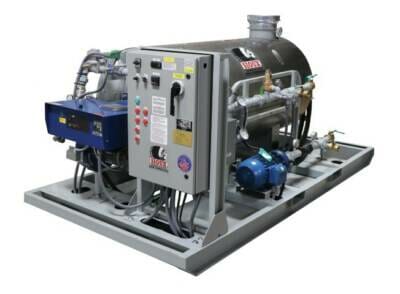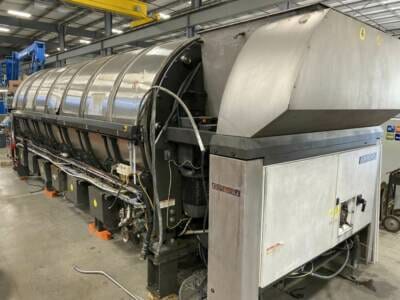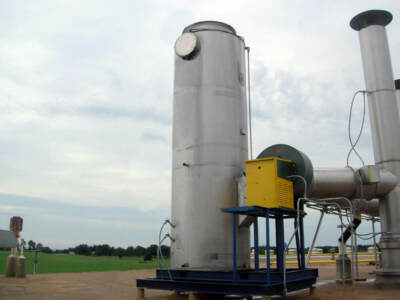[ez-toc]
Save Energy and Money With a Concrete Hot Water Tank
 When you think about how many buildings, sidewalks, and construction projects use cement, it’s obvious why cement plants have to function at peak performance every day. For wet-mix concrete plants, water efficiency is crucial for daily operations. A concrete hot water tank is one of the best solutions for wet-mix concrete plants.
When you think about how many buildings, sidewalks, and construction projects use cement, it’s obvious why cement plants have to function at peak performance every day. For wet-mix concrete plants, water efficiency is crucial for daily operations. A concrete hot water tank is one of the best solutions for wet-mix concrete plants.
Wet-mix concrete plants depend on an abundant supply of hot water for continuous operation. Without the supply of water, operations come to a sudden halt and cost you valuable time and energy. A concrete water tank will eliminate any concerns of a paused water supply, and instead will save you more time and money. Consider researching industrial machinery specialists that sell industrial water heaters to start narrowing down your selection.
Next, find out more about why concrete plants depend on concrete hot water tanks.
Cold Climates
Many concrete producers have discovered recently that direct-contact concrete hot water tanks work better in colder climates than direct-fired hot water tanks. Hot water is necessary for all wet-mix plants, but cold climates have a drastic effect on water temperatures during the mixing process. A direct-contact concrete hot water tank ensures the consistency of the concrete mix even during cold weather.
A direct-contact concrete plant water heater is better suited for cold climates than direct-fired water tanks. Direct-contact concrete hot water tanks heat water on demand and take up less ground area. A direct-fired tank requires a firetube that takes time to collect water in the bottom of the cylinder. A direct-contact concrete plant water heater costs about as much as a direct-fired water heater, saving you more money already.
Maintenance
 Many concrete producers have discovered recently that direct-contact concrete hot water tanks work better in colder climates than direct-fired hot water tanks. Hot water is necessary for all wet-mix plants, but cold climates have a drastic effect on water temperatures during the mixing process. A direct-contact concrete hot water tank ensures the consistency of the concrete mix even during cold weather.
Many concrete producers have discovered recently that direct-contact concrete hot water tanks work better in colder climates than direct-fired hot water tanks. Hot water is necessary for all wet-mix plants, but cold climates have a drastic effect on water temperatures during the mixing process. A direct-contact concrete hot water tank ensures the consistency of the concrete mix even during cold weather.
A direct-contact concrete plant water heater is better suited for cold climates than direct-fired water tanks. Direct-contact concrete hot water tanks heat water on demand and take up less ground area. A direct-fired tank requires a firetube that takes time to collect water in the bottom of the cylinder. A direct-contact concrete plant water heater costs about as much as a direct-fired water heater, saving you more money already.
Heating Controls
The control panel of a direct-contact concrete plant water heater maintains the mix temperature with a digital controller. This allows plant personnel to easily adjust the water temperature on the screen instead of messing with valves and pipes. The control panels of direct-contact hot water tanks are UL-rated and NEMA 4 standard approved. The UL standards guarantee the quality and safety of the electrical system of the concrete hot water tank.
Other safety control features of the concrete plant water heater are low water-level switches. These switches prevent the burners from firing unless there is steady water flowing through the heater. This helps the walls of the water heaters from overheating and damaging the integrity of the heater. The NEMA 4 enclosure ensures watertight protection from splashing water, rain, sleet, ice, dirt, or dust. The high-efficiency control panels and safety features of a direct-contact concrete plant water heater ensure your water heater runs safely and properly, saving you money and value labor time.
Upgrade Your Hot Water Heaters Now
 If you’re ready to save time and money in your concrete plant, it’s time to switch to a direct-contact concrete hot water tank. The tank’s ability to operate at peak performance in colder climates guarantees you will always have a functioning water heater, even in the worst climates. The low maintenance work and safety controls of the hot water tanks make life easier on your plant workers and let you focus your time and energy elsewhere in the plant.
If you’re ready to save time and money in your concrete plant, it’s time to switch to a direct-contact concrete hot water tank. The tank’s ability to operate at peak performance in colder climates guarantees you will always have a functioning water heater, even in the worst climates. The low maintenance work and safety controls of the hot water tanks make life easier on your plant workers and let you focus your time and energy elsewhere in the plant.
When you’re ready to upgrade your concrete hot water tank, invest in a company that is a leading supplier of water heating equipment to find the best water heater for your concrete plant.
